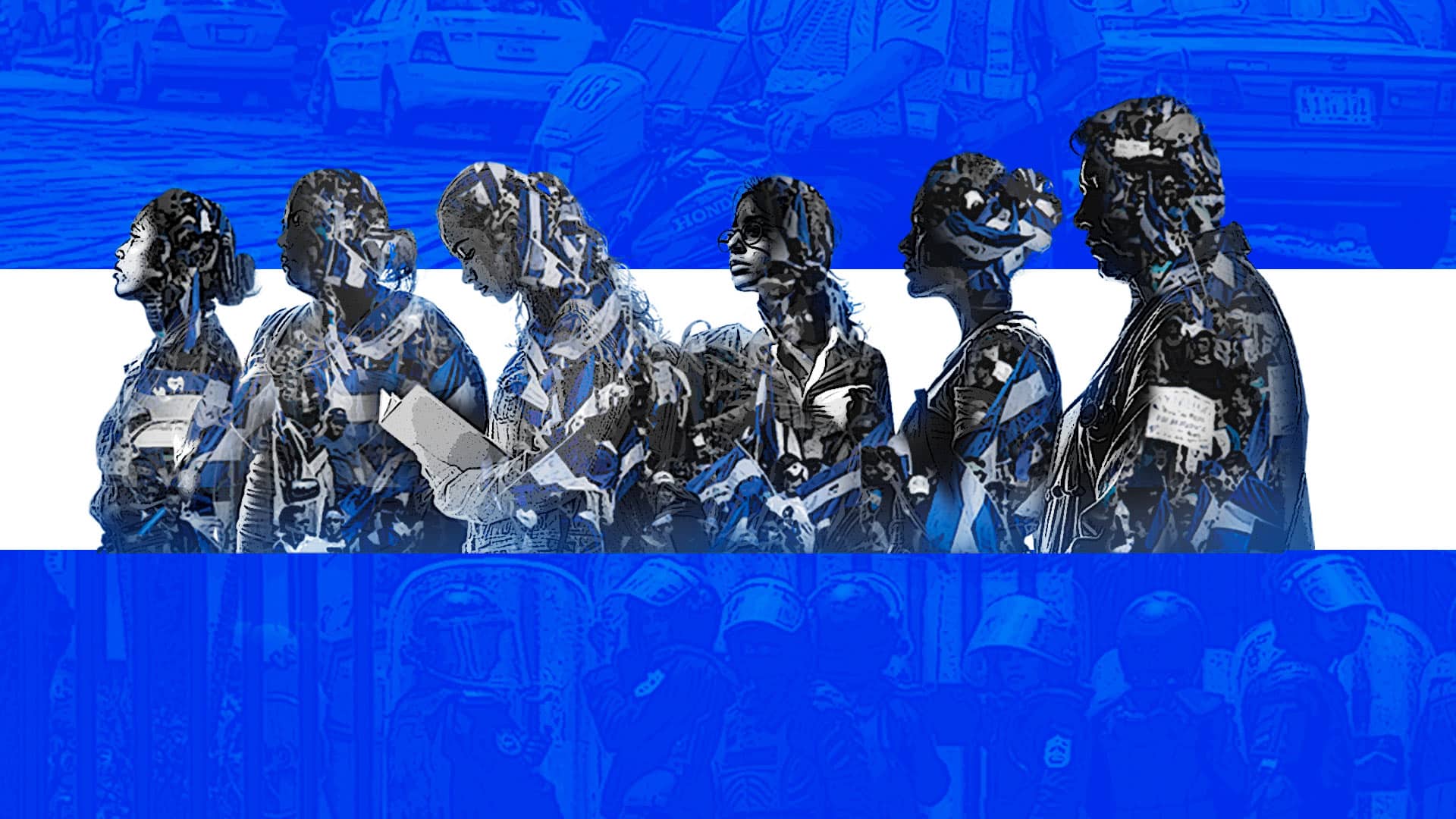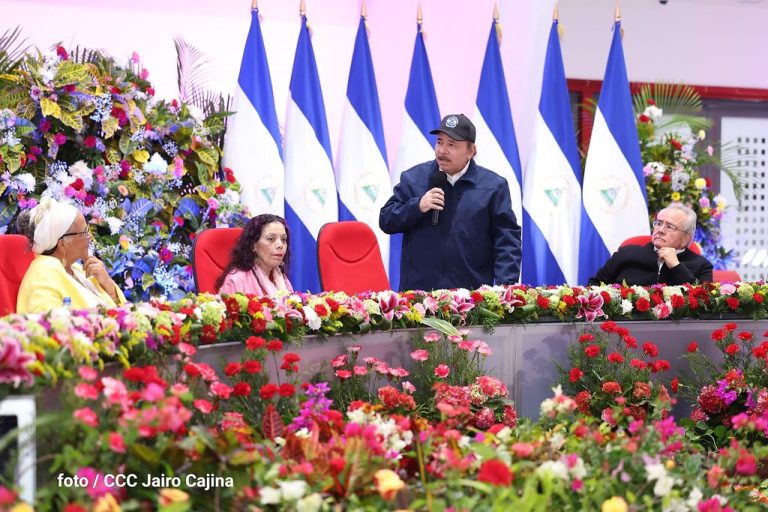11 de enero 2023

Six Years With April in Tow: Life Under Nicaragua's New 'Normal'

PUBLICIDAD 1M
PUBLICIDAD 4D
PUBLICIDAD 5D
The resistance of Monsignor Alvarez and political prisoners, the succession crisis of the family regime, and the discontent of government officials

Daniel Ortega y Rosario Murillo en la inauguración del nuevo período legislativo de la Asamblea Nacional, en el Centro de Convenciones Olof Palme, el 9 de enero de 2023. // Foto: CCC
On January 10, 1978, during the dictatorship of Anastasio Somoza, my father, Pedro Joaquin Chamorro, was assassinated. The murder of this journalist, director of the La Prensa newspaper and anti-Somoza political crusader marked a before and after in the history of Nicaragua. The general indignation his assassination sparked among all sectors of the country, and their demand for justice, culminated in an explosion of national protest, which in turn unleashed a popular insurrection against the Somoza regime.
Forty-five years later, in the twilight of another dictatorship, the democratic legacy of a man who provided a consistent example of what he preached is still fully relevant: full democracy and free elections; political pluralism and accountability; strict term limits with no reelection; separation of public affairs from private interests and the fight against corruption; social justice reforms; freedom of the press and of expression. These ideas still comprise a road map for Nicaragua to become a Republic once again.
Today, Daniel Ortega is beginning his sixteenth consecutive year in power. He began by heading an authoritarian regime (2007-2017), then became part of a bloody family dictatorship (2018-2020). The last two years (2021-22), his dictatorship became completely totalitarian. In the twentieth century, during the decade of the Sandinista revolution, Ortega served as coordinator of the Government Junta for National Reconstruction (1979-1984), after which he became President of the Revolutionary Government from 1985-1990.
Without counting the 16-year interval of democratic transition in Nicaragua (1990-2006), when he “governed from below” by encouraging violent protests and blackmail, derailing the State through his powerful network of influences, Ortega has controlled the Executive branch, the Army and Police, and other State powers for 27 years, in two different phases of government. His longevity in total power has surpassed the nearly 17 years that Anastasio Somoza Garcia ruled (1937-1947 and 1950-1956). Like “old Tacho,” Ortega now is attempting to perpetuate himself in power through a dynastic succession.
However, despite the fact that his wife, Rosario Murillo, has already been cemented into the line of constitutional succession as Nicaragua’s vice president, the dynastic succession of the family regime remains a permanent source of fissures, tensions and contradictions. As such, it’s one of the dictatorship’s weakest links.
In contrast to the regimes in Cuba and Venezuela, which have based themselves on an authoritarian Party-State political model – through which Fidel Castro’s power was transferred to Raul Castro and then to Miguel Diaz Canel, while in Venezuela the baton passed from Hugo Chavez to Nicolas Maduro – the Ortega-Murillo regime is a family dynasty. This, in the XXI century, is an anachronism. It doesn’t lean on a political project or ideology, but depends ever more on repression, the personality cult of the Comandante and his Compañera,” and their discourse of hate and vengeance.
Even within the Manichean simplification that branded Cuba, Venezuela and Nicaragua the “Trio of Tyranny” in the era of Donald Trump, the majority of the Latin American and European countries, especially those on the democratic left, have drawn a marked distinction between the Ortega-Murillo regime and those of Cuba and Venezuela. Nicaragua is viewed as a bandit regime, a pariah, condemned by vote of a large majority in the OAS and the UN for massive human rights violations.
The latter – Cuba and Venezuela – are questioned as authoritarian regimes that restrict freedom and democracy, but there are reasons of State interest for promoting a negotiated strategy at the end of the tunnel. That’s because, unlike Ortega, these countries have something to offer the international community.
After massacring the civic protests and annulling the elections, Ortega and Murillo can no longer govern without a police state and political prisoners. Nor do they offer any plans for political transition. The idea of a transition back to democracy failed in the two national dialogues (2018 and 2019), when Ortega refused to negotiate an electoral reform with the Civic Alliance for Justice and Democracy and failed to implement the agreement to suspend the police state.
In 2021, he finally squandered his last opportunity for transition by jailing the seven candidates who had aspired to running against him, declaring the two major opposition parties illegal, and essentially annulling the election by eliminating all political competition. What’s left now is an All or Nothing: the forced imposition of Rosario Murillo’s project for dynastic succession and still further radicalization of the repression; or the fall of the regime, as a consequence of its own wearing out, its internal fissures, the impact of international political pressure, the resistance of the political prisoners, all culminating – finally – in the recovery of civic space.
While Ortega is living through his lowest hours in politics, his successor, Rosario Murillo, exercises a bureaucratic leadership that, for many in her own circle of power, amounts to a fraud. Her omnipotent command generates “loyalty” by striking fear into her subordinates, coupled with fear of vengeance instilled in her countless adversaries in the new and old Sandinista ranks. The children of Ortega and Murillo, who manage the family’s multi-million-dollar private businesses fed by the State, act as their go-betweens with Venezuela, Cuba, Russia and China, the regime’s international allies. However, there’s no “crown prince” with their own political or leadership support, or with the charisma to underpin Murillo in power and position themselves as the “heir.”
Clearly, Ortega and Murillo can prolong their permanence in power, as long as the country maintains its economic stability and they have the resources to maintain the well-oiled channels of patronage that underlie their political power. Above all, they can maintain power, as long as they retain the loyalty and technology for directing the repressive apparatus – the Police, the Army, the surveillance and paramilitary forces, the prosecutors and the courts. However, in the middle run, the system will tend to wear down, as their base of political support wanes. Meanwhile, a growing discomfort is being generated among the high public functionaries.
In 2022, when there were no more apparent “enemies” in sight since all the political and civic leaders were in prison, including priests and bishops from the Catholic Church, a new class of political suspects became the focus of the regime’s mistrust – the public employees, both civilian and military. After a wave of leaks reached the press regarding corruption, desertions and resignations, the high political functionaries became the objects of the presidential couple’s extreme vigilance. As the result of this “witch hunt”, some former government workers are now in jail, accused of corruption. Others are even accused of the same bogus crimes of “conspiracy” and “propagating fake news” that the regime has used to charge the opposition leaders they call “coup promoters.”
The corruption and rivalry between the political operators of Ortega and Murillo for the booty of the inner circle can neither be cured nor solved, because the root of the Government’s moral degradation lies in the blurred lines between public and private, exemplified by the ruling family themselves. That’s the chief source of corruption. The road towards democracy demands not only more information to make clearer the denunciations of corruption, but also to embrace the dissident public servants who have no responsibility for the repression and corruption, with a guarantee that after Ortega and Murillo, the honest public employees have a future place as part of the national solution.
The resistance displayed by Monsignor Rolando Alvarez and the political prisoners has also had a decisive impact on the dictatorship’s crisis of succession. They represent the hope for democratic change. Matagalpa Bishop Rolando Alvarez is a prisoner, who today will be tried for the spurious crime of “conspiring against the national sovereignty,” because he refused to accept the banishment the regime offered. Under house arrest, but with his dignity intact, the Bishop continues defying the dictatorship, in a mute appeal to the Vatican and the international community to end the persecution of the Catholic Church in Nicaragua. Monsignor Alvarez continues embodying the prophetic voice of the Church that Ortega has never been able to silence.
In the El Chipote jail, after several hunger strikes and 85 days of complete isolation, the political prisoners were finally allowed three family visits in December, in an cordial atmosphere for the first time. This reveals that the regime has partially ceded to national and international campaigns to end the cruelty and isolation in the jail. Ortega has sought to improve his image and reduce his isolation internationally. However, he still continues the regimen of solitary confinement for Dora Maria Tellez, and the prohibition of all reading and writing materials for the political prisoners. Even the established right to normal visitations is wielded as blackmail.
Ortega’s latest pretense is to “normalize” the political prisoners’ condition and silence the families’ demands, while he raises himself up as judge and threatens “life imprisonment” for the political prisoners who demanded free elections. In contrast, the national demand, which needs to be assumed more forcefully by the human rights advocates and the international community, continues being the nullification of the spurious trials and the liberation of all the political prisoners, in order to begin the liberation of Nicaragua as a whole.
This past year, 2022, brought a massive exodus to the United States and Costa Rica, in which 328,000 Nicaraguans left for economic reasons associated with the political crisis in a country where they currently see no future and no way out. The explosive growth of migration represents 3 billion dollars in family remittances, or 17% of Nicaragua’s GNP, a fact which favors the economic stability that Ortega advocates. Nonetheless, in 2023 the economic growth will likely weaken, with fewer jobs, greater poverty and the increasing cost of living.
The economy will continue shrinking, without fully collapsing, while the business leadership is subjected to political and economic extorsion and remains disconnected from any attempts at democratic change. Neither the business owners, nor the military, which has allowed the creation of an illegal paramilitary army, represent a force for change.
The resistance of Monsignor Alvarez and the political prisoners, the crisis of succession within the family regime and the discontent of the high public functionaries are the dictatorship’s weakest links, although they’re not enough in the short run to activate a political way out. In order to make viable the possibilities for political change, Nicaragua imperatively needs sustained international pressure over the medium term – a pressure that’s incremental and proportional to the magnitude of the repression, in order to effectively weaken the dictatorship’s repressive pillars.
This article was originally published in Spanish in Confidencial and translated by Havana Times.
PUBLICIDAD 3M
Periodista nicaragüense, exiliado en Costa Rica. Fundador y director de Confidencial y Esta Semana. Miembro del Consejo Rector de la Fundación Gabo. Ha sido Knight Fellow en la Universidad de Stanford (1997-1998) y profesor visitante en la Maestría de Periodismo de la Universidad de Berkeley, California (1998-1999). En mayo 2009, obtuvo el Premio a la Libertad de Expresión en Iberoamérica, de Casa América Cataluña (España). En octubre de 2010 recibió el Premio Maria Moors Cabot de la Escuela de Periodismo de la Universidad de Columbia en Nueva York. En 2021 obtuvo el Premio Ortega y Gasset por su trayectoria periodística.
PUBLICIDAD 3D